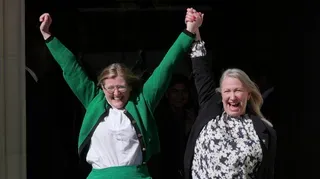March 1, 2015
Transgender Law Center Gains Partner, Heads South
Kilian Melloy READ TIME: 3 MIN.
The organization Southerners on New Ground, known as SONG, has been fighting for the rights of LGBT people in the U.S. South for 20 years. And now, it has gained a new partner - the Bay Area-based Transgender Law Center.
"It feels really big. And also really needed and critical," said Kris Hayashi, who took over this month as executive director of TLC.
The partnership, which will be called TLC@SONG, will be opening a new office in SONG's home city of Atlanta sometime this spring. TLC is planning to hire two people at that office, a regional director and a staff attorney. These employees will be "embedded in SONG," said SONG co-director Caitlin Breedlove.
The collaboration will help TLC reach more people in the country.
"We started as a California-based organization," Hayashi said, but "we have been doing work nationally for some time now."
TLC will be going from one of the country's best-funded regions in terms of LGBT issues to the worst funded region. According to a report from LGBT Funders, one-third of LGBT people in the U.S. live in the South, but the region only receives 3 percent of the country's LGBT funding. In 2012, $4 million in LGBT funding went into the city of San Francisco alone, compared to a total of $4.8 million for the entire South, which includes 14 states.
In this context, less competition for funding and more collaboration are needed, Breedlove said.
Breedlove and Hayashi, along with SONG co-director Paulina Helm-Hernandez, have been discussing the possibility of working together for over a year. TLC wanted to expand its reach, but doesn't have connections in the south; SONG has "depth of connection" in the South, as Hayashi put it, but doesn't have specific expertise on trans rights organizing or in legal and policy issues.
It seemed like a logical collaboration. Still, the groups were cautious.
"We wouldn't want to come in as people who are not from the South and don't live there with a preset idea of what the need is and what the work should look like," Hayashi said.
This has been a pattern in the region, Breedlove, who identifies as queer, said.
"The South has a long history of national organizations coming in, in the LGBT sector and other places, and not considering or centering the people in our region," she said. "If TLC was doing this alone, they would have to spend a great deal of time building relationships and building trust, which they'll still have to do. But given the urgency of the moment we want to see organizations collaborate."
That urgency, Breedlove said, "is literally life or death."
"Since the year began, there have been six murders of trans women of color, in less than a month and a half," Hayashi said. Hayashi recently spoke at a demonstration at San Francisco City Hall in partnership with the Taja Coalition, a group formed after trans woman Taja DeJesus was stabbed to death in San Francisco February 1.
These deaths were part of the reason that LGBT Black Lives Matter activists stormed the stage at this year's Creating Change conference in Denver, demanding that national LGBT organizations support trans people of color leadership and focus their work on ending the crisis of murders of trans women. Since Hayashi spoke to the B.A.R. on February 13, two more trans women, Bri Golec and Kristina Grant Infiniti, have been murdered in the United States.
"What we saw at this year's Creating Change was a real demand saying, don't just talk about us, be about us. Don't just talk about what's happening to us, center our leadership," Breedlove said.
One SONG project that aims to do that is its recently launched Free From Fear campaign. The campaign supports local organizing in Southern towns to pass municipal ordinances that "hold the police and city council accountable for profiling based on race, gender, sexual orientation, and immigration status."
Kilian Melloy serves as EDGE Media Network's Associate Arts Editor and Staff Contributor. His professional memberships include the National Lesbian & Gay Journalists Association, the Boston Online Film Critics Association, The Gay and Lesbian Entertainment Critics Association, and the Boston Theater Critics Association's Elliot Norton Awards Committee.




